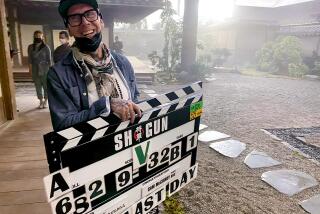Blind Allegiance
Talk about the wrong place at the wrong time. In “Nagasaki Dust,” a carefree Japanese American college student touring his parents’ homeland during the outbreak of war between the United States and Japan faces an unenviable choice: imprisonment (and probable death) or conscription into the Japanese army. His decision comes back to haunt him when he’s put on trial for treason by the victorious American military.
W. Colin McKay’s well-crafted courtroom drama is a probing moral inquiry in the best Arthur Miller tradition--exploring broad underlying human conflicts that crystallize in personal choices.
Intriguingly forgoing the obvious, McKay ensures that the one dilemma UCLA undergraduate-turned-prison camp officer John Okui (Yuji Okumoto) doesn’t face is, ironically, one of national loyalty: He never sees himself as anything but an American citizen in a tight spot. He only opts for the army hoping for an opportunity to escape and make his way home, and when his translation skills land him a position overseeing Allied POWs in Nagasaki, he does everything in his power to help them (sometimes at his own peril).
If anything, Okui is a victim of his own tendency toward accommodation, a trait threaded through flashbacks of his life in America. Shrugging off prejudice toward himself, his dignified father (Jim Ishida) and his less forgiving girlfriend (Trisha Dong), John naively believes in the American ideal of racial equality. Okumoto’s immensely sympathetic performance shades the full layers of Okui’s tragedy--even the flexible bough that bends can be broken.
Pursuing the appearance rather than the reality of fairness, Okui’s American military persecutors, typified by the intractable Col. Bowman (Robert Samson), refuse to see him as anything but a traitor. They’re far more sinister because their blindness is so unconscious. Even Okui’s defense lawyer, Lt. Randolph (Christian Campbell), accepts the case merely as an advantageous career move. In well-played confrontations with his client, Campbell’s Randolph oozes brusque, brittle contempt. His gradual acceptance of Okui’s innocence is less convincing.
Yet despite some awkwardly unrealistic lapses and occasional belaboring of the obvious, the play successfully turns the tables on the unexamined values of the majority. Issues such as the United States’ internment of Japanese Americans and the devastation wrought by the atomic bomb broaden the political backdrop, but never at the expense of the gripping personal drama.
In the feverish memories and visions that haunt Okui in his prison cell, Anthony Barnao’s staging artfully enlists elements of Kabuki theater, including Tony Masa-choreographed masked figures and an unsettling percussive score by Bill Brown and George T. Abe. With this impressively mounted and skillfully performed debut production, the Blue Sphere Alliance stakes a claim to high artistic standards and social relevance--a committed theater company that merits close watching.
BE THERE
“Nagasaki Dust,” Lex Theatre, 6760 Lexington Ave., Hollywood. Thursdays-Saturdays, 8 p.m.; Sundays, 2:30 p.m. Ends Sept. 13. $15. (213) 466-1767. Running time: 2 hours, 55 minutes.
More to Read
The biggest entertainment stories
Get our big stories about Hollywood, film, television, music, arts, culture and more right in your inbox as soon as they publish.
You may occasionally receive promotional content from the Los Angeles Times.










